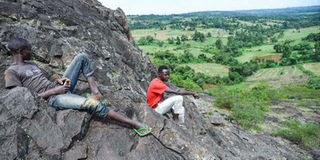Scenic cliffs from which Nandi elderly jumped to their deaths

Youths relax on a cliff overlooking Lelmokwo in Nandi County at Koigaro Falls which is on Chepteon River on December 18, 2019. The area was known as ‘Sheu’ was where aged people threw themselves backwards while holding hands and singing because they have 'overstayed on earth'. PHOTO | JARED NYATAYA | NATION MEDIA GROUP
What you need to know:
- Holding hands as they sang, standing close to the edge of the cliffs, they would suddenly jump off the cliff backwards.
- The ritual was elaborate, and was performed at the open field between the months of October and March, during the dry season.
Atop the scenic hills in Nandi County are cliffs that served as ‘sheu’ (mercy killing) grounds for the community’s elderly during the pre-colonial period.
Legend has it that elderly Nandi who were tired of living would take their own lives by plunging down the 150-metre cliffs overlooking Lelmokwo at Koigaro Falls on Chepteon River.
36 HOURS
It is also said those from the Kipnyikei age set would, before taking the plunge, hold special prayers on an open field on top of the cliffs, where rituals mimicking a real burial would be held.
“This is where those with debts would declare them and bid farewell to the younger generation, before going to the ‘other world free’. ‘Kakibe aje sheu, kaimutech Cheptailel Kipsengwet (We are going to heaven, God is taking us to heaven,’ they would say,” Mr Elkana Tenai, who was born in the area, told the Nation.
Holding hands as they sang, standing close to the edge of the cliffs, they would suddenly jump off the cliff backwards.
The ritual was elaborate, and was performed at the open field between the months of October and March, during the dry season. It is said to have lasted more than 36 hours.
It is also here that the departing elders would bless the younger generation as they prepared for their journey to meet Asis (Nandi for God).
HYENAS FEAST
They would hold hands to ensure that they all died. It also discouraged cowards from changing their minds at the last minute.
After the elderly’s plunge to death, hyenas would throng the area to feast on their bodies.
“It was a bad omen if your body was not eaten by wild animals and certain rituals, including slaughtering a black goat, would be performed to stop you from bringing calamities to the community,” said Ms Cheptalam Taprandich, 100.
When the Nationvisited the cliffs, about five kilometres west, off the Eldoret-Kapsabet Highway recently, the stones in the field that served as seats for those attending the sheu ritual were still neatly arranged, although the ritual was abandoned more than 100 years ago with the advent of Christianity.
The young have renamed the open field “Garden Square” and can sometimes be found relaxing on the rocks, enjoying the beautiful scenery.
HUMAN BONES
“It’s not for nothing that our forefathers lived for over 100 years. They left us a lot of blessings,” said Mr Tenai.
Until today, skeletons and human bones can be found on the bed of the Chepteon River, which meanders through the area.
Ms Taprandich says the ritual was abandoned in the early 1900s, after the local residents embraced Christianity and education with the arrival of missionaries in the region.
“People who had lived for long would ask to be allowed to go, claiming that their age mates who had died earlier were calling them,” added Ms Taprandich, then a young woman.
Among the Nandi, it was a bad omen for one to see their grandchildren. Those who lived to see their grandchildren, known as chemakigat if a girl and kimakigat if a boy, would not shake their hands in greeting.
Instead, they would hold out their walking cane for the grandchildren to greet.
LONG LIFE
Although the ritual was abandoned many years ago, cases of visitors to the area slipping and falling from the cliffs have been reported. Interestingly, some locals still attribute such accidents to the belief that the victims’ ancestors had called them. So, what was the secret to the Nandis’ long life, which saw some tire of living and take their own lives?
“Our people used to eat natural foods, including meat, brown ugali and honey. They also depended on traditional herbs, which kept diseases at bay,” says 90-year-old Sitama arap Rotich of the Chumo age set. His grandfather, who was from the Kipnyikei age set, died through the sheu practice.
“They would say, ‘Please don't stop us. We have lived long enough,” he recalled.
Is there a site you want us to feature? Write an e-mail to [email protected]




